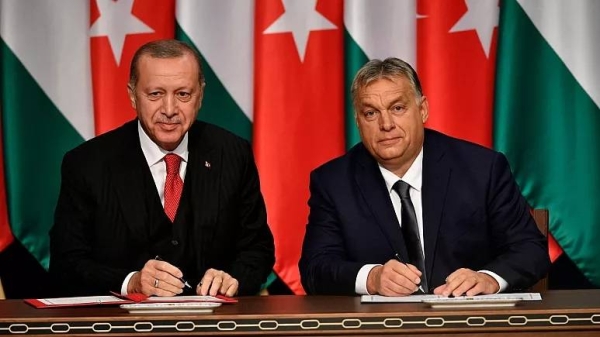
Greece denied it had agreed to hold NATO-brokered talks with Turkey
It demanded the immediate withdrawal of all Turkish ships from the Greek continental shelf as a pre-condition to calm the tension
ANKARA: NATO has taken the initiative to reconcile Turkey and Greece over their spat in the Eastern Mediterranean, but tensions are still running high and experts are skeptical about any immediate outcome.
It announced that Turkey and Greece have agreed to hold “technical talks” to calm military tensions in the region over disputed gas drilling activities.
Greece denied it had agreed to hold NATO-brokered talks with Turkey and demanded the immediate withdrawal of all Turkish ships from the Greek continental shelf as a pre-condition to calm the tension. Ankara, however, backs the idea and expects that talks would focus on preventing accidental clashes.
The differences over exclusive maritime borders and energy exploration rights between the two regional rivals remain as sharp as ever, and commentators said they were unlikely to be resolved immediately through NATO-brokered talks.
“The current crisis between Turkey and Greece has similarities to the 1974, 1987 and 1996 crises between the countries and hence, while there is clearly a chance for escalation, these two countries also have a record of limiting the level of violence between them,” Gallia Lindenstrauss, senior research fellow at the Institute for National Security Studies in Israel, told Arab News.
According to Lindenstrauss, the matter of delimitation of exclusive economic zones (EEZ) will be tackled at some point through negotiations, but the question is whether the sides are ready yet for serious talks.
Athens delivered a letter on Turkey’s activities in the Aegean and the Eastern Mediterranean to UN Secretary-General Antonio Guterres on Friday, requesting him to submit it to the Security Council.
“It seems that the Greek side is still holding to its past positions and that Turkey is using this crisis for a larger agenda than just the legal dispute. Hence, even if the sides will move to negotiations, I would not expect them to achieve more than partial delimitation, if anything,” Lindenstrauss said.
Germany is taking steps to initiate more dialogue between Greece and Turkey, after Chancellor Angela Merkel held talks with Turkish President Recep Tayyip Erdogan on Thursday.
Paul Antonopoulos, an expert on Turkish-Greek relations, agreed that technical talks between Greece and Turkey will not produce any results due to the disagreements over pre-conditions.
“As Turkey not only refuses to send its ships back to port, but has actually increased war and invasion rhetoric against Greece, discussions will not occur under these conditions,” he said.
Antonopoulos thinks that Turkey’s recent moves in the East Mediterranean, as well as in Syria, Iraq and Libya, have been motivated by a maximalist push for neo-Ottomanism.
“It is unsurprising that Turkey’s military interventions have all been in countries that are not only former Ottoman territories, but are energy-rich,” he said. “When we look at Turkey’s military escalations wanting to control energy deposits and its flows to support the country’s growing population and economic progress, dialogue to resolve issues with Greece will not be fruitful.”
Madalina Sisu Vicari, an independent expert on energy geopolitics, thinks that the ideal solution for all the disputes related to the Aegean and East Mediterranean, would be if Greece, Turkey, and Cyprus could settle their maritime issues through bilateral and trilateral negotiations, eventually assisted by a third party.
“However, though in flux, the current relations between the three countries, in conjunction with the late power competitor dynamics triggered by France’s goals and actions in East Mediterranean, have dramatically reduced the likelihood of such a solution,” she said.
Another option for Vicari would be to bring the matters to the International Court of Justice (ICJ) in The Hague or to international arbitration.
“But the latter, in principle, has the disadvantage of being less acceptable in case of an unfavorable verdict, and Ankara is not keen on the former option. So a more feasible option would be for the parties to ask the ICJ to rule on the principles that must be applied for the resolution of the disputes, and leave the final settlement to themselves,” she said.
Vicari noted that the delimitation of the continental shelf in the North Sea, followed by the agreements between Germany and the Netherlands, and between Denmark and Germany, occurred following such an ICJ ruling.












